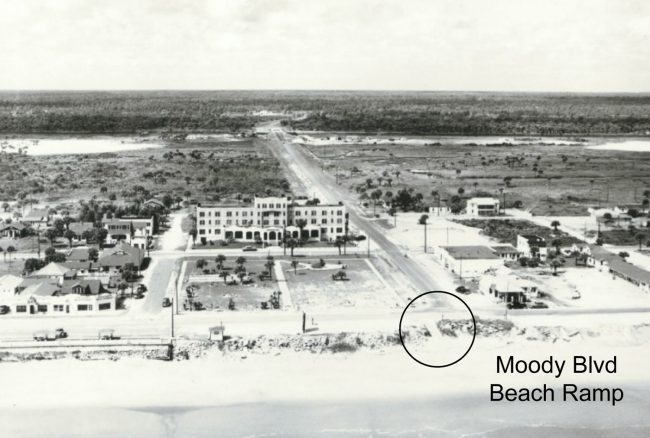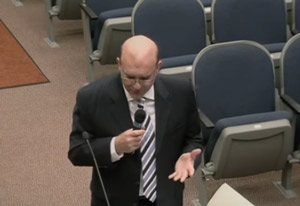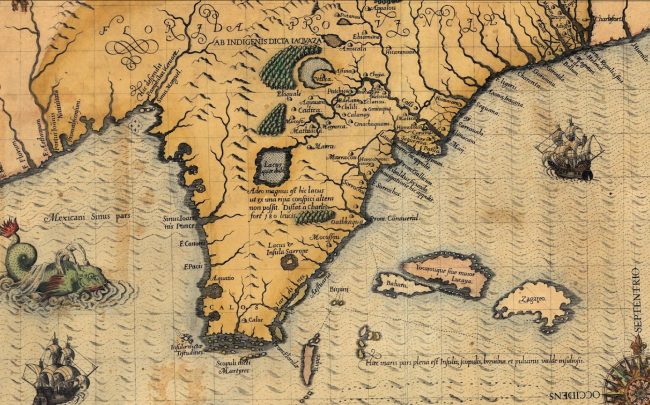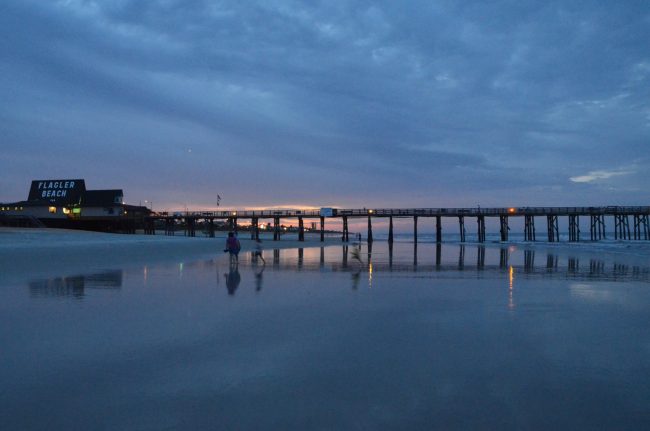
The Flagler County Commission Monday unanimously adopted a precedent-setting ordinance that preserves so-called customary public use of 18 miles of beaches in the county, including those beach sands that fall within private property.
The ordinance was made necessary by a new law that redefines property rights along the beach, giving property owners the right to fence off their portions of dry sands, and giving local governments until July 1 to pass ordinances that might prevent such walling off.
Might, because the ordinance Flagler passed faces an uncertain future and has a good chance of being challenged in court for several reasons: the law the Legislature hurriedly passed on the last day of the last legislative session, while intended to clarify language in other respects, is less clear in the new language about customary use and property rights. It can be interpreted in any one of at least three different ways, according to County Attorney Al Hadeed, and likely will be until the matter is settled either by courts or by the Legislature. Meanwhile, Hadeed expects Flagler to draw a lawsuit and be made an example of by property right advocates looking to test the new law.
“If somebody is going to file a suit, it’s going to be a straw-man type situation,” Hadeed said, “where because this might be viewed as a very significant private property rights issue, maybe somebody might want to make an example of us.”

If that happens, then the county is prepared to answer the challenge in court with a replica of what it’s done since last month: four public hearings on the proposed ordinance, each featuring a number of long-time Flagler residents, including past elected officials, historians and business owners, who testified to the uninterrupted years and miles of customary public use of Flagler’s beaches. The testimonies were designed to build a solid record of such use to better withstand a challenge in court. A legal challenge would address one specific property as opposed to the entirety of Flagler’s shore, but the four hearings were expressly designed to address all 18 miles.
The Legislature passed the new law ostensibly to address an issue in Walton County, where beaches are much flatter and extend much further from a private property into the white sands. Residents there have sought to wall off their portions of beach. But the new law applies statewide, making it possible that such walling off could take place in front of homes or big hotels and resorts, thus creating a form of beach segregation unheard of in Florida’s history, racist-based segregation aside. Flagler’s hearings did not touch on that other peculiar custom on Florida beaches when Jim Crow made “customary use” a distinctly white privilege, itself an echo of colonial times when French or Spanish reigns over the same shores made attempts by Native Americans to use the beaches equally hazardous.
The Legislature gave local governments until July 1 to pass ordinances establishing customary use of beaches. Without such an ordinance, a local government would then have to first ask a court’s permission and prove its case before declaring customary use on any of its beaches. “It did create a very substantial change in the way local government enacts ordinances. “This is the only situation that we know of,” Hadeed said of the new law, “where a local government has to go to court first to get permission to enact an ordinance.”

Flagler beat the deadline by less than two weeks through that run of hearings, a remarkable display of oral history, documentation, cartography, legal arguments and probabilities that could have formed the basis of a long chapter in a book on Flagler’s history–or a centerpiece of its centennial celebrations last year. From a legal perspective, the hearings were also an attempt at documented overkill of customary use, a pre-emptive strike at the expected legal challenge: Hadeed was in essence saying on behalf of the county: bring it on. He has his own precedents on which to base his self-confidence: Hadeed was the architect of the county’s 2014 vacation-rental ordinance. It became a template for other governments’ ordinances and a lightning rod for the vacation-rental industry’s attempts three year running to scrap the law that made it possible. The industry’s efforts have so far failed.
While the commission’s adoption of the customary-use ordinance appeared a foregone conclusion from the first hearing, Hadeed took pains Monday to lay out the legal hazards ahead. The law is so unclear that it leaves open several possibilities, some of them absurd: “if somebody adopted an ordinance between March 23 and July 1 and they go through all that work, it’s automatically voided?” Hadeed asked rhetorically, summing up one of the three ways to interpret the law. “That doesn’t make any sense, that’s an absurd result. But that is one interpretation.”
Flagler’s ordinance could also “go into suspended animation” and be rendered unenforceable until resolved in court. The third and to Flagler most wished-for interpretation, is that the county’s ordinance prevails until somebody challenges it, and it remains enforceable until a court says otherwise.
![Flagler County is spending over $40 million to restore beaches in the wake of Hurricanes Irma and Matthew. 'The expenditure of public funds to restore the dunes is in part justified by the importance of the beaches to the county's economy and [their] use by the public' for recreation, the county states. (© FlaglerLive)](https://flaglerlive.com/wp-content/uploads/beach-restoration-1-300x200.jpg)
What is more certain is that no other government has invested as much time and effort into developing a customary-use ordinance, and few have passed one (Flagler Beach among them). “Nobody has invested the kind of time and work that we have put in—not only the language that we’re adopting but also in terms of the factual development,” Hadeed said.
Throughout those four hearings, the county saw no public opposition to the proposed ordinance, either at the hearings themselves or in writing to the commission. Just four residents wrote the commission as part of the public comment process, all in favor of customary use.
Monday’s hearing continued the series of public testimonies by residents and experts, the latter including a long presentation on the cartographic history of the area by Steve Davis, a Painters Hill resident who’s handled two dozen customary-use cases in New Jersey and helped the county on beach restoration issues after the hurricanes.
His report went back to the earliest maps of the Florida shore, dating to the late 16th century, when the French were the first to draw them. He traced the history of the first railroads further west, the first roads in Flagler—King’s Road in the 18th century, Old Brick Road in 1914, the opening of Ocean Shore Boulevard in 1927, the same year of the opening of the Bridge of Lions in St. Augustine, creating “50 miles of basically customary use of our beach,” he said. Those miles were tiled with cut-throughs and dune bridges indicative of the public use of the beaches.
“You could drive to Jacksonville or Ponce Inlet, Daytona Beach to the south, and people often did, as you’ve heard testimony,” Davis said of the years when beach driving was allowed. “From 1983 to 2004, those access points were changed to the parks only, north of Flagler Beach, but there was still significant vehicular access at the parks until the ban of beach driving in 2004. In 2004, beach access today, there’s no longer driving on the beach but all of the same customary use activities are still conducted on the same extent of areas as they were from beach motoring access.”

He finished his presentation with a quote from a 1974 Florida Supreme Court case: “No part of Florida is more exclusively hers, nor more properly utilized by her people than her beaches.” (See Davis’s complete presentation here. Give the very large file time to load.)
Others who spoke Monday included Gail Wadsworth, the former clerk of court, and Adam Mengel, the county’s planning director.
“The big deal of my life was to—I’m not an elected official anymore, I can say this,” Wadsworth said, “was run as fast as you could run and dive off the end of the Flagler Beach Pier and swim back in with my dad right beside me, on my birthday, in February. We were nuts. But it was fun. The other thing that we did that is really important to Flagler County’s history, I think, and I don’t think we started it at all, I know that my mother and—and I have forgotten her name—Marjorie Kinnan Rawlings, sat the World War II watch tower at Crescent Beach together.” Painter’s Hill had one such tower as well.
“We’re engaged in a very serious undertaking, we spent a lot of time accumulating the information,” Hadeed said as a preface to what turned into his closing argument for the ordinance. “I think we’ve presented a very strong case for the facts on customary use. But that doesn’t necessarily mean that just because that’s there, you should pass an ordinance. That’s a whole separate legal consideration.”
But commissioners did just that with no discussion other than to congratulate the man who’d orchestrated the four hearings, along with Flagler Beach attorney Dennis Bayer. After the vote, commissioners themselves did something they’d never done in recent memory after the passage of an ordinance (it’s usually the audience): they applauded.
![]()
Customary Use Ordinance and Analysis (2018)
Click to access flagler-county-customary-use-ordinance-2018.pdf






























Concerned Citizen says
OK so I am confused here.
According to this the county just did away with private property and gave the public the right to use it as they see fit.
If I own beach property and want to fence it in for my use shouldn’t I have that right? Other than a sense of undeserved entitlement what gives us the right to use someone Else’s land. Beach or otherwise.
After recent littering events at Flagler Beach I can see why some owners would not want the public on their property.
For instance. You and 20 of your friends decide to celebrate 4th of July on someones private beach. You drink and eat and leave bottles and trash. Who picks it up? They do.
I clean a lot of common areas in the City and surrounding parts. I can tell you most people are disrespectful and have a not mine to worry about attitude. It is most noticeable around holiday’s and weekends
In my opinion and it’s just that this ruling sets a bad precedence by letting Government manage our property. It’s almost like the imminent domain they use when you own a home and they want to run a road thru your front yard.
Andy brunk says
Is dry sand beach on their deed ?
Anonymous says
In all honesty our beach in Flagler is a bit different it’s not very wide and many homes do not have raparion rights with their deed apparently according one Owner she said many years ago some were purchased by the state she couldn’t remember and she thought she too had sold her small actually very small piece which when selling she found out she still owned. needless to say it’s sand and for no other reason estedics no one who loves the beach wants signs and Little barriers for the tiny spot they own and then what about nature and turtles and replenishment and protection of the dunes shall we worry, yes because right now we get help will each individual get help that remains to be seen. Our shore is beautiful hope we can come to understanding
Steve Robinson says
Al, keep up the good fight! Denying Floridians unfettered access to the beach would be like Colorado privatizing the Rocky Mts.
Agkistrodon says
Funny they don’t want tax payers to use “their” beach, but they want tax payers to bail them out when mother nature wants to take Her land back.
fiscal says
Any chance making sure that dogs don’t freely run on the beach?
Anonymous says
that is right, you don’t own that part, and who ever told you did fooled you.
Anonymous says
The issue here is two fold one access to the beach that is PUBLIC lands two privet property rights. IMO this is ALL about Government giving BIG resorts and or other ocean front bossiness control over who can sit outside and enjoy the beach. YES they and others who OWN ocean front property do have on many if not most land that is theirs on the tax roles that gos directly to the normal high tide mark. So YES they “OWN” that part of the beach. That being said I dont think any should be NOT allowed to walk through that part of their lands. setting up a beach picnic there is a different story IMO. The best and simplest answer IMO would have been a 10-12 foot easement from the high water mark to privet property. The STATE should buy all such lands.
Pogo says
@Republicans keep pretending history begins with their election – the public’s rights in this matter are ancient.
justinian code on beach access
https://www.google.com/search?q=justinian+code+on+beach+access&ie=utf-8&oe=utf-8
Anonymous says
Beaches are Public period.